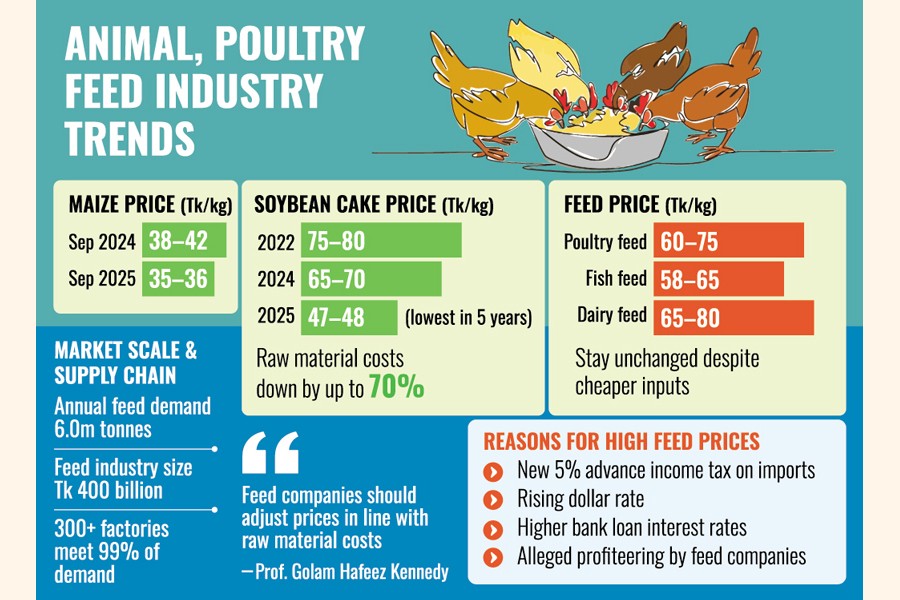Feed prices high despite cheaper inputs
Farmers losing out and consumers paying more for protein-rich foods

Published :
Updated :

Despite record harvests of maize and a glut of soybean cake in storage, the cost of animal and poultry feed remains stubbornly high, leaving small farmers struggling and consumers paying more for protein-rich foods.
Maize and soybean cake prices have fallen to their lowest levels in five years, yet feed millers are accused of keeping retail feed prices artificially inflated.
Industry groups and economists warn that this disconnect between raw material costs and feed prices is squeezing farmers' profit margins, forcing many to abandon livestock and poultry farming.
With over 450 million heads of livestock and poultry depending on feed, the issue has significant implications not only for farmers but also for food inflation, nutrition, and livelihoods across the country.
The country has produced a record quantity of maize this year, while edible oil refiners are holding record stocks of 4.0 million tonnes of soybean cake. Both factors have pushed raw material prices down.
Maize traded at Tk 20-26 per kg during the harvesting season in May-June but now sells at Tk 35-36, compared to Tk 38-42 per kg during the same period last year, industry data show.
Prices of maize and soybean cake are currently at their lowest in five years, according to the Bangladesh Vegetable Oil Refiners and Vanaspati Manufacturers Association (BVORVMA), and the Bangladesh Poultry Association (BPA).
The BVORVMA says soybean and rapeseed cake production has reached more than 4.0 million tonnes, while demand is only about 2.2 million tonnes.
Biswajit Saha, Director of City Group, producer of Teer edible oil, notes that soybean cake prices have dropped to Tk 47-48 per kg, from Tk 65-70 in 2024 and Tk 75-80 in 2022.
BPA President Sumon Hawlader accuses leading feed companies of artificially inflating prices.
He says feed prices remain unchanged despite maize prices falling by 20 per cent and soybean cake prices by 70 per cent. According to him, companies are making an extra Tk 10 profit per kg above their usual margin.
Currently, poultry feed costs Tk 60-75 per kg, fish feed Tk 58-65, and dairy feed Tk 65-80 per kg.
Hawlader says companies sharply raised feed prices after the Russia-Ukraine war in 2022 and have not reduced them, even as global raw material costs fell. Instead, he argues, prices have been raised further.
Hafizur Rahman, a poultry farmer in Keraniganj, Dhaka, told The Financial Express that feed still costs around Tk 70 per kg.
He explained that a bird needs at least two kilogrammes of feed to reach maturity, yet farm-level poultry prices remain capped at around Tk 160 per kg. Because of this imbalance, many farmers have shut down over the past three years, he said.
According to Shariful Haque, Deputy Director of the Department of Livestock Services, Bangladesh has more than 450 million livestock and poultry, including chickens, ducks, fish, cows, buffaloes, goats and sheep, most of which depend on feed, consuming around 6.0 million tonnes annually.
The Department of Fisheries adds that the country produces over 2.6 million tonnes of farmed fish each year, requiring about 1.0 million tonnes of feed.
The Feed Industries Association of Bangladesh (FIAB) estimates that more than 300 factories meet 99 per cent of the country's feed demand, with an annual market size of Tk 400 billion.
FIAB Senior Vice President Md Ahsanuzzaman said a large share of raw materials still needs to be imported, while a new 5.0 per cent advance income tax on imports, along with the rising dollar rate and higher bank interest costs, makes further price reductions difficult.
Meanwhile, protein food prices remain elevated. According to the Trading Corporation of Bangladesh (TCB), the Department of Agricultural Marketing (DAM), and city kitchen markets, eggs are selling at Tk 145-150 per dozen, broiler chicken at Tk 190-200 per kg, beef at Tk 780-800 per kg, and farmed ruhi/katla at Tk 350-500 per kg.
Agricultural economist Professor Golam Hafeez Kennedy noted that locally produced maize and soybean cake now meet more than 85 per cent of raw material demand.
He urged feed companies to adjust their prices to reflect lower raw material costs in both domestic and international markets.
He also called on the fisheries and livestock ministry to regulate the feed market so that farmers and consumers, not just millers, can benefit.
tonmoy.wardad@gmail.com


 For all latest news, follow The Financial Express Google News channel.
For all latest news, follow The Financial Express Google News channel.